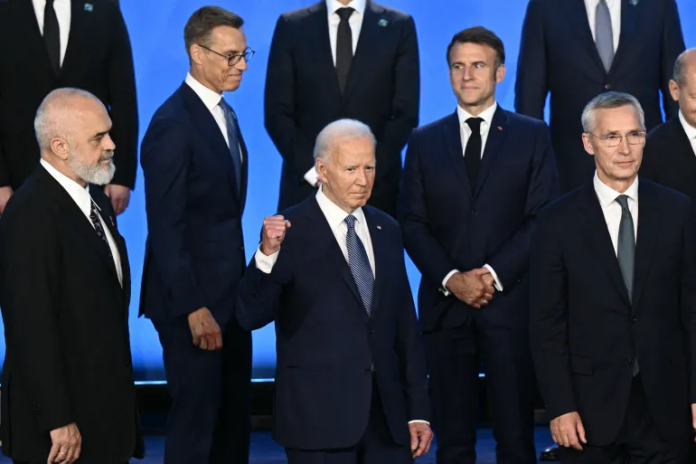The US is holding the 2024 NATO Summit in Washington, DC, in honour of the 75th Anniversary of the Alliance, according to the White House website.
The meeting takes place from 9 to 11 July 2024. The US gathered all 32 allies to “demonstrate the continued strength and unity of the Transatlantic Alliance.” President Joe Biden reaffirmed the United States’ unwavering commitment to the transatlantic relationship and to Article 5 of the Washington Treaty, which states that an attack on one is an attack on all.
Allies continue to strengthen their collective support for Ukraine, reaffirming their commitment that Ukraine’s future lies in NATO. In addition, NATO leaders in Washington will push forward the implementation of NATO’s new defence plans, ensuring that “Allies are prepared to deter threats and defend every inch of NATO territory.”
NATO Allies also welcomed the election of Mark Rutte as the next Secretary General, expressing their respect and appreciation for Jens Stoltenberg.
The Washington summit will also strengthen NATO’s relationship with Ukraine as the countries gather for the second meeting of the NATO-Ukraine Council at the leaders’ level. Ukrainian President Volodymyr Zelensky will meet with NATO leaders to discuss the Alliance’s continued support for Ukraine in its ongoing war against Russia.
Defence spending
At the summit, allies will announce new steps to provide military, political and financial support to Ukraine.
These elements taken together with Allies’ bilateral support for Ukraine, form the bridge to Ukraine’s future NATO membership.
NATO Security Assistance and Training for Ukraine (NSATU) will coordinate equipment, training and force development efforts to support Ukraine on its path to NATO compatibility. The three-star general, based in Germany, will lead the effort in Allied countries.
To further deepen Ukraine’s institutional relationship with NATO, the Secretary General has decided to appoint a senior civilian representative in Kyiv to serve as the focal point for NATO’s engagement with senior Ukrainian officials.
Allies will also announce their intention to provide minimum core funding of €40 billion over the next year.
“The Alliance is spending more than ever on critical new defense procurement as well as research and development. When the Biden-Harris Administration took office, only nine Allies met the Vilnius defense investment commitments to spend at least two percent of GDP on defense.”
Twenty-three Allies are now meeting or exceeding their defence spending commitments. In Vilnius, Allies adopted a Defence Production Action Plan “to better connect our defence industries with defence planning, facilitate more joint procurement, and make it easier for Allies to acquire the equipment they need to meet NATO’s capability targets and standards.”
NATO has agreed to award $10 billion worth of contracts to produce weapons and ammunition to resupply Allies. Countries will also take further steps to increase defence industrial production.
Strengthening global partnership
NATO can now tie Alliance forces to specific geographic regions and tasks, providing an even greater focus on Alliance operations, activities and investments.
For the third consecutive year, NATO leaders invited Indo-Pacific partners Australia, Japan, New Zealand and the Republic of Korea to participate in the NATO Summit at the highest level.
NATO and Indo-Pacific partners will meet alongside the European Union and the European Commission to discuss the growing nexus between Euro-Atlantic and Indo-Pacific security, including co-operation between Russia and North Korea.
NATO Allies and partners in the Indo-Pacific will deepen practical co-operation and launch four new flagship projects. Projects will focus on supporting Ukraine, enhancing cooperation in cyber defence, sharing information on challenges related to disinformation and engaging in artificial intelligence through an expert group.
Allies at the Vilnius Summit endorsed resilience goals “to ensure our Alliance will be better prepared against any threat or hazard.” Allies, including the United States, are also preparing the first-ever national resilience plans.
The US plan builds off the historic work we’ve already undertaken to strengthen our national resilience.
Allies also use NATO as a platform to share information on cyber threats in real time. For the first time, select NATO partners participated in this year’s NATO Cyber Defence Commitments Conference. Partners shared best practices and lessons learnt in protecting national infrastructure from cyber threats.
Countries also took steps to counter the growing threat of global terrorism.
“NATO’s 2022 Strategic Concept identifies terrorism as NATO’s most direct asymmetric threat.”
Response from Ukraine and Russia
Meanwhile, Ukrainian President Volodymyr Zelensky complained that the NATO summit had lost significance amid the expected US presidential election in November.
It seems that people hardly notice the historic expansion of NATO with two new countries – it has been overshadowed by another story.
Russian Deputy Foreign Minister Mikhail Galuzin said Russia would not participate in such events.
“We are aware of the intentions of [Ukraine] and its Western handlers to ‘rehabilitate’ for the failed ‘peace summit’ in Swiss Bürgenstock in mid-June this year and try to hold a similar event.”
Earlier, a source said Saudi Arabia was being considered as one of the possible venues for the next peace summit. Russian presidential spokesman Dmitry Peskov clarified that Putin did not reject the possibility of talks with Ukraine. However, he recalled that Kyiv had imposed a legal ban on negotiations and rejected Moscow’s peace proposals.
